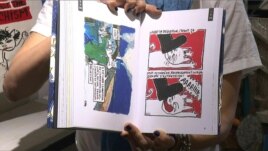19 December 2020
Zine El Abidine Ben Ali, a former military officer, was president of the North African country of Tunisia from 1987 to 2011.
As the dictator promised new freedoms to a country in revolt, Nadia Khiari compared it with a cartoon she drew of a cat, Willis from Tunis, speaking to a group of mice.
The next day, January 14, 2011, Ben Ali fled the country. He was forced out after large protests against his rule. But Willis from Tunis remains and has since become the icon of the protest.
"I decided to use this character to tell the story of what was happening in my country," said Khiari.
Ten years after the revolt, Khiari continues to share political cartoons on Facebook using cats to describe Tunisia. "For me as an artist, it was a true revolution, because from one day to the next I was able to express myself freely," she said.
At first, family and friends were Khiari's main supporters. But she now has more than 55,000 followers. In November, Khiari published the latest Willis the Tunis book. It represents her best work since the revolution.

This image grab from AFP TV shows "Willis from Tunis" cartoon cat series.
Tunisia's revolution
Tunisia's revolution, with its demands for "work, freedom and national dignity," started various protests across North Africa and the Middle East known as the Arab Spring.
But many Tunisians continue to experience economic difficulties, corruption and failing public services. The only change is that they now have the right to say what they think.
In one of Khiari's cartoons from 2018, Willis from Tunis lies silently on the floor, a boot mark on his face, with the words "Before the revolution."
The next image shows Willis under the same boot shouting "AAAAIIIE!" with the saying "Today, happily we have freedom of expression."
Khiari says Ben Ali's fall let her creativity grow more freely with political cartoons. She now uses her art to criticize post-revolution politicians. Many people see them as being as corrupt as Ben Ali's government.
"Hide your wallet," one of the cats tells another as they walk towards the government's headquarters. "There are lots of robberies in this area."
Ten years after the fruit seller Mohamed Bouazizi set fire to himself, Tunisians, again, are protesting and asking for more jobs and investments.
The economic problems have worsened because of COVID-19. Thousands of health workers protested recently in front of failing public hospitals. They wanted the health minister to resign after a young doctor died in an old hospital elevator. They blamed corrupt officials for the incident.
In this environment, Khiari connected with the image of a cat in business clothes sitting behind a desk saying, "The government fights corruption." Another cat says with a big smile, "If you want to speed up the process, that can be arranged."
Khiari says that while the media describes Tunisia as a "laboratory of democracy," the reality is closer to that of an area under construction.
Khiari is also a leader for Cartooning for Peace, the organization created by the U.N. to "fight with humor for the respect of cultures and freedoms."
Freedom of the press is a continual battle in Tunisia. Reporters Without Borders (RSF) found that suppression against the media and journalists is worse since the election of the new president. For Khiari, that means the fight that started 10 years ago is far from finished.
I'm Armen Kassabian.
Agence France-Presse reported this story. Armen Kassabian adapted it for VOA Learning English. Hai Do was the editor.
We want to hear from you. Write to us in the Comments Section and visit 51VOA.COM.
_______________________________________________________________
Words in This Story
cartoon – n. a drawing in a newspaper or magazine intended as a humorous comment on something
icon – n. a widely known symbol
character – n. a person or animal who appears in a story, book, play, movie, or television show
revolution – n. an attempt by many people to end the rule of one government and start a new one
dignity – n. the quality of being worthy of honor or respect
wallet – n. a small folding case that holds paper money and credit cards
robberies – n. the crime of stealing money or property
elevator – n. a machine used for carrying people and things to different levels in a building
arranged – n. to organize the details of something before it happens
construction – n. the act or process of building something (such as a house)